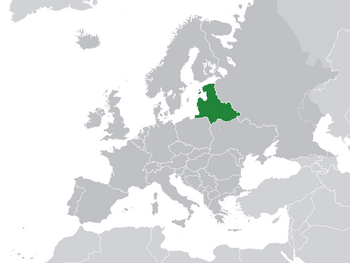Baltania
Republic of Baltania Baltanijos Respublika Baltānijas Republika | |
|---|---|
| Anthem: Mūsų gimtinė didžioji Mūsu dzimtene lielā "Our Great Homeland" | |
 Location of Baltania (green) in Europe (dark grey) | |
| Capital | Rjabova (legislative and judicial) Vilnius (executive) |
| Official languages | Lithuanian and Latvian |
| Recognised regional languages | Livonian Latgalian |
| Ethnic groups (2022) |
|
| Demonym(s) | Baltanian |
| Government | Unitary constitutional directorial republic |
• Presidency | Antanas Kuodys Alīna Eglīte |
• Prime Minister | Kristina Nugaraitė |
• Speaker of the Seimas | Raminta Žutautienė-Gauba |
| Legislature | Seimas |
| Independence from Germany and the Soviet Union | |
| 11 March 1990 | |
| Area | |
• Total | 397,947 km2 (153,648 sq mi) (60th) |
| Population | |
• Estimate | 28,361,180 |
| GDP (PPP) | 2022 estimate |
• Total | $264 billion |
| GDP (nominal) | 2022 estimate |
• Total | $143 billion |
| Gini (2022) | medium |
| HDI (2021) | very high |
| Currency | Euro (EUR) |
| Time zone | UTC+2 (EET) |
• Summer (DST) | UTC+3 (EEST) |
| Date format | mm-dd-yyyy (AD) |
| Driving side | right |
| Calling code | +384 |
| Internet TLD | .bl |
Baltania ('bɔlteɪnia; Lithuanian: Baltanija, Latvian: Baltānija), officially the Republic of Baltania (Lithuanian: Baltanijos Respublika, Latvian: Baltānijas Republika), is a country in the Baltic region of Europe. It is bordered to the north by the Scandinavian Federation, to the east by Russia and to the south by Poland and Ukraine. Baltania covers an area of 397,947 km2 (153,648 sq mi), with a population of 28.3 million. Its capital and largest city is Rjabova; other major cities are Vilnius and Kaunas.
Baltania is a developed country, with a high-income advanced economy, ranking high in the Human Development Index. It ranks favorably in terms of civil liberties, press freedom, internet freedom, democratic governance and peacefulness. Baltania is a member of the European Union, Schengen Agreement and ASTA.

